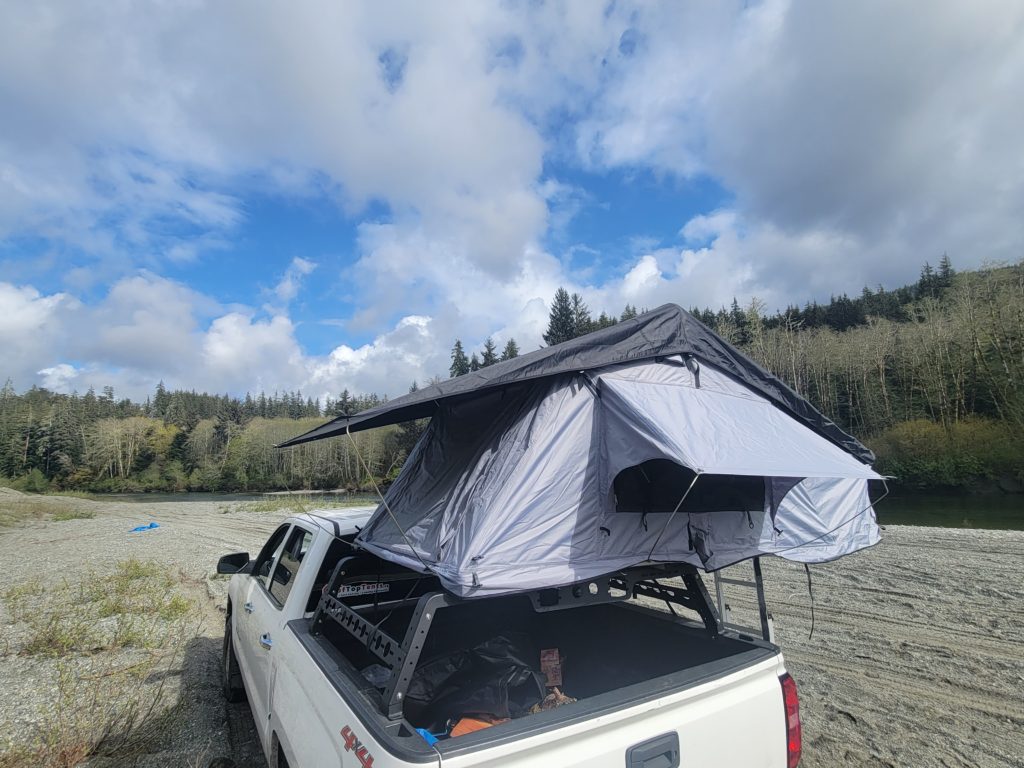Most times picking out the perfect rooftop tents can be challenging because tents come in various sizes, shapes, colors, textures, and functionality. There are a variety of tents being sold, each with its various purposes and functionality depending on what you are looking for.
There are two main designs of rooftop tents to choose from: Soft-shell and Hard-shell.
Soft-Shell Rooftop Tent
Like their name, their rooftop tents are lighter, making them easier to lift and set up. They are usually made from light materials such as canvas or nylon, which are attached to a platform frame hanging off your vehicle’s roof.
The tent body is often made of a rigid platform that includes fiberglass, aluminum, or hard plastic.
Pros:
· Price
Compared to hard-shell tents, a soft-shell tent is affordable and suitable for people on a tight budget. Even as pocket friendly as the soft-shell rooftop tent are, they are still made from quality products that last a long time.
· Maximized Space
One of the main advantages of a rooftop tent is that it offers a ton of space to roam freely, making it one of the best, most spacious options. And depending on the model, an average soft-shell tent can comfortably accommodate anywhere from 1-4 people. This additional space makes soft shell tents suitable for family camping trips and space to store camping gear.
The larger room allows you to hang out and move around inside.
· Travel Size and Performance
One might think it is hard to transport around because of how large a softshell tent gets. But as a matter of fact, they are relatively light to pack in and transport, making them suitable for smaller vehicles.
The fabric build also makes them lighter than their hard-shell counterparts, which demand a less heavy-duty roof rack and less manpower for lifting.
Cons:
· Noise
The canvas material that covers the aluminum frame of a softshell rooftop tent does a decent job of blocking out light, heat, and some weather elements. However, the sound still filters through quickly due to its thin construction. Therefore, if you’re looking for a camping solution where they can rest without being disturbed by outside noises such as barking dogs or people talking late at night, then a softshell rooftop tent won’t meet your needs.
· Challenging Setup
Soft-shell rooftop tents are harder and more time-consuming to set up than hard-shell rooftop tents. Some take up to 15-20 minutes to assemble, depending on the model and your speed.
Hard-shell Rooftop Tent
The hard shell RTT is similar to the soft shell, but it is way more comfortable and easier to set up and take down. Hard rooftop tent walls are often made from durable waterproof fabric such as nylon or canvas. They usually have a rigid outer shell made from hard plastic, fiberglass, or aluminum and are often considered luxury tents for overlanders.
Plus, they provide you with better weather protection and improved gas mileage.
Pros
· Easy to Set up
One of the major advantages of a hard-shell rooftop tent is that it is easy to set up, taking less than a minute to set up fully. Special lift-up mechanisms are fitted on them, making it easy to set up in just a matter of minutes, unlike a soft-shell tent in which you have to go through a little bit of stress to set up as it doesn’t have a lift-up mechanism.
· More Durable
Hard-shell rooftop tents are more durable when compared to soft-shell rooftop tents because they’re made from superior materials. The top shell of a hard-shell tent gives more protection and stability than a full-fabric tent. They are the best choice when camping in the winter as they can be used as a four seasons tent.
Aluminum and plastic are more waterproof than nylon or canvas, making the roof portion of these tents more compatible with wet or snowy climates.
· More comfortable
This is a more reliable and comfortable option because they are built with a thicker and superior quality mattress than the soft-shell models. The interior is more uniform than the soft shell, offering luxury and comfort.
· Warmer
Because of how thick and well-built they are, they tend to get warm even in extremely cold environments. The underside of the top shell has insulation built into the underside, making them suitable for winter camping.
· Hard Shell Tents Are Less Noisy
Because of how thick hard-shell tents are built, they make less noise even in extremely windy situations. They are properly insulated to keep the cold and noise outside, making them suitable for people who like to sleep in an extremely quiet environment.
Cons
· Price
A hard-shell rooftop is a more expensive option when compared to the other option. It is less budget-friendly than a soft-shell rooftop tent. Although expensive, they are worth every penny as they tend to last longer and are extremely comfortable.
· Heavier
Because most hard shells come with some mechanisms, they tend to be heavier than the soft-shell rooftop tent. Also, the extra weight comes from the rigid top shell. A large piece of aluminum or fiberglass weighs much more than tent fabric.
· Smaller Sleeping Surface
Unlike soft-shell tents, you are limited by the size of your vehicle roof. You do not have an extra space like that of a soft-shell tent that expands beyond the size of the roof
Conclusion
Depending on what you’re looking for, both soft-shell and hard-shell rooftop tents have their advantages and disadvantages, so it is left to you to figure out the one that fits your interest. They are both great rooftop tents, although they are a little bit distinct from each other.
Shop your quality rooftop tent and other camping gear here.


